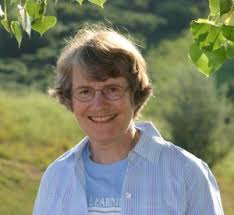By Orlan Love
Cedar Rapids Gazette
SOLON — It took a scientist’s growing concern for her grandchildren’s future and her own observations of accelerating destabilization of the beloved

Mutel, a University of Iowa ecologist trained in detecting subtle changes in the balance of nature, connects those dots in “A Sugar Creek Chronicle: Observing Climate Change from a Midwestern Woodland,” to be published next month by the University of Iowa Press.
Writing from the perspectives of scientist, nature lover and grandmother, Mutel blends natural history, personal memoir, weather descriptions and climate science into gentle encouragement for planet-saving lifestyle changes.
In doing so, she presents her own struggles with cancer as a metaphor for the illness threatening the earth.
“I’m a very private person — not one who wants to put myself out there,” said Mutel, whose previous books have been written from a more detached perspective.
She did so, she said, to make her book more inviting to everyday readers — people who, she writes in her introduction, have “loved family, treasured a special place, worried about illness, been touched by beauty and by loss, felt drawn to things non-human, wondered about our rapidly changing world and worried about where the future is taking us.”
Long aware that the burning of fossil fuels is heating the earth’s atmosphere, Mutel has striven to reduce her own carbon footprint, nearly 40 years ago building with her husband, Robert, an energy-efficient home complete with composting toilet.
Mutel, senior science writer at IIHR-Hydroscience & Engineering in Iowa City, said her thinking about climate change evolved rapidly after 2010, when she edited a report on climate change effects for the Iowa Legislature.
“I thought it was somewhere off in the future, that we had time to deal with it, that someone else would take care of it. I didn’t realize how fast it was happening,” she said.
Mutel traces her book’s beginning to late 2011 when she committed to keeping a journal of her daily woodland hikes for her then-unborn granddaughter Ellie.
As 2012’s extreme weather unfolded, upsetting the familiar seasonal patterns at the 16-acre woodland surrounding her rural Solon home, Mutel resolved to integrate her daily observations with reflections on her own lifelong search for attunement with nature and explanations of the science underlying climate change.
‘Deeply disturbing topic’
Her approach sets her work apart from other writings on the subject, according to two leading Iowa scientists who have read advance copies of the book.
“She combines solid science with a human touch. She explains how climate change has impacted her personally,” said Iowa State University climate scientist Gene Takle, who notes that her credibility is above reproach.
“She’s not writing that to seek grant funding. She has no financial skin in the game,” Takle said.
Mutel’s longtime colleague, IIHR-Hydroscience & Engineering Director Larry Weber, said the book clearly presents the most salient points of climate science literature from an apolitical and humanist point of view.
“It’s a compelling style that many people can identify with,” he said.
Asked how Iowans can most readily observe the effects of climate change, Mutel replied, “It’s the water — more annual rainfall, more extreme rain events, more rain frontloaded into the spring and early summer.”
Those conditions, she said, have in recent years heavily eroded the banks of the unnamed stream that drains the timber surrounding her home — the stream she calls Sugar Creek because it flows through the Sugar Bottom neighborhood near Coralville Lake.
Mutel calls climate change “the most deeply disturbing topic” she’s ever addressed and acknowledges that writing about it took an emotional toll.
Internalizing the complexities and hazards of climate change — learning “more than I wanted to know about the possible disappearance of all that I loved” — immersed her, she said, in “a deep state of grief and quiet despair.”
Midway through the project, Mutel said she engaged a counselor to guide her through her growing depression.
Hope returned and her outlook brightened, she said, as she learned more about positive initiatives to reduce the fossil fuel emissions that are heating the earth’s atmosphere.
Mutel will discuss her new book at 7:30 p.m. March 10 at Prairie Preview XXXIII at the Celebration Farm, 4696 Robin Woods Lane NE, Iowa City, and will read from it at 7 p.m. March 30 at Prairie Lights Books in Iowa City.
Ecology talk
• Cornelia Mutel will discuss her new book at 7:30 p.m. March 10 at Prairie Preview XXXIII at Celebration Farm, 4696 Robin Woods Lane NE, Iowa City.
• She will read from it at 7 p.m. March 30 at Prairie Lights Books, 15 S. Dubuque St., Iowa City.